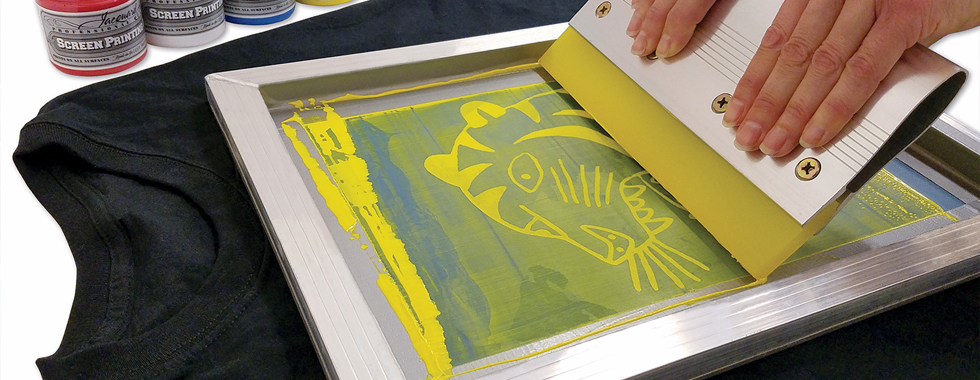The Vital Overview to Understanding Screen Printing and Its Versatile Utilizes
Screen printing has a rich history that goes back to old times, evolving into a sophisticated method made use of across numerous markets today. This guide explores the details of the screen printing procedure, detailing its applications in advertising, fashion, and home decoration - 10:9 Design reviews. Recognizing these basics can open imaginative potential for both industrial and creative tasks. The complying with sections will certainly expose crucial ideas and methods to enhance one's screen printing endeavors
The Background of Screen Printing
Although screen printing has roots that map back centuries, its evolution mirrors the creative and technical advancements of various cultures. Coming from old China, the method was at first utilized for enhancing textiles and later spread to Japan, where it ended up being integral to Ukiyo-e woodblock printing. The approach shifted to Europe in the 18th century, where it gained popularity amongst craftsmens and industrial printers. The innovation of image solution in the 20th century changed screen printing, enabling for more elaborate layouts and higher efficiency. Artists like Andy Warhol additionally moved its appeal, using the tool to create famous jobs that blended commercialism and art. By the late 20th century, screen printing had actually developed itself as a functional technique, utilized in vogue, advertising, and great art. Today, it remains to advance, incorporating digital technology and increasing its applications throughout different sectors.
The Screen Printing Refine Explained
Screen printing changes creative visions into substantial styles through a series of accurate actions. Initially, an image is developed and then moved onto a screen, normally made from fine mesh material extended over a framework. A light-sensitive solution is put on the screen, which is revealed to light, hardening in areas not covered by the image. After cleaning out the unhardened emulsion, a pattern is developed.
Next off, the screen is placed over the substrate, whether it be textile, paper, or an additional material. Ink is after that pressed with the open locations of the stencil using a squeegee, depositing the design onto the substrate below. This process can be duplicated for numerous shades, requiring different displays for each color. The printed thing is healed making use of heat to guarantee the ink sticks properly, resulting in a resilient, vibrant layout ready for use.
Sorts Of Screen Printing Techniques

In addition, specialized strategies, such as discharge screen printing, get rid of color from the fabric to produce softer prints, while foil screen printing uses metal aluminum foil to achieve a shiny surface (10:9 Design contact). Each strategy offers distinct features, accommodating numerous creative requirements and manufacturing scales, eventually increasing the opportunities within the screen printing domain name
Applications of Screen Printing in Different Industries

Additionally, the signage and marketing industries make use of screen printing for developing appealing display screens and banners. This technique permits vibrant colors and detailed layouts that catch focus. In electronic devices, screen printing is utilized for applying conductive inks to motherboard, crucial for part connections. Additionally, the home decoration sector welcomes screen printing to produce distinctive styles on textiles and wall art. Generally, screen printing works as a vital device throughout diverse areas, boosting products with customized and aesthetically appealing graphics.
Tips for Effective Screen Printing Projects
While undertaking a screen printing task, mindful focus to information can considerably improve the last end result. Initially, choosing high-grade products is essential; this consists of the screen, inks, and substrates. Using ideal mesh matters can impact ink deposition and information resolution. Preparation is equally crucial; complete cleaning of displays and appropriate direct exposure times ensure crisp prints.
Next off, precise enrollment is crucial for multi-color prints. Making use of alignment devices can assist achieve exact layering. In addition, screening prints on scrap products prior to manufacturing helps identify prospective problems without throwing away sources.

Often Asked Concerns
What Products Are Best for Screen Printing on Material?
Cotton and polyester blends are ideal for screen printing on textile due to their toughness and ink absorption. Furthermore, specialty textiles like silk or canvas can generate special appearances and surfaces, improving the overall design high quality.
Exactly how Do I Tidy and Maintain Screen Printing Tools?
To keep and clean screen printing tools, one need to routinely clean displays with proper solvents, inspect mops for wear, lube relocating parts, and shop all items in a completely dry, dust-free environment to prolong their life-span.
What Are the Ecological Effects of Screen Printing?
Screen printing can have significant ecological influences, including chemical waste from solvents and inks, water usage throughout cleansing processes, and energy consumption. Environmentally friendly products and sustainable methods are necessary for lessening these unfavorable impacts.
Can Screen Printing Be Done in your home Efficiently?
Screen printing can be properly done at home with the appropriate materials and techniques. Hobbyists can create quality prints, though success depends on their ability level, devices, and understanding of the procedure entailed.
What Are the Costs Related To Beginning a Screen Printing Company?

Starting a screen printing service includes prices for devices, products, and work area. Initial get more info costs usually vary from a few hundred to numerous thousand bucks, relying on the range, quality of equipment, and preferred production ability.
Screen printing has an abundant background that dates back to old times, progressing into a sophisticated method used across various industries today. An additional strategy, rotary screen printing, employs cylindrical displays, assisting in constant printing on material rolls, therefore enhancing efficiency for large manufacturings. In addition, specialized strategies, such as discharge screen printing, remove color from the textile to produce softer prints, while aluminum foil screen printing applies metallic aluminum foil to accomplish a shiny surface. In the fashion industry, screen printing is widely used to develop vibrant designs on clothing, enabling brand names to display their distinct styles. Cotton and polyester blends are suitable for screen printing on textile due to their longevity and ink absorption.